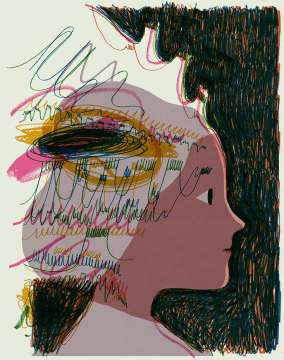Neurological evidence for chaos in the nervous system is growing.

Illustration by Josh Cochrane
In one important way, the recipient of a heart transplant ignores its new organ: Its nervous system usually doesn’t rewire to communicate with it. The 40,000 neurons controlling a heart operate so perfectly, and are so self-contained, that a heart can be cut out of one body, placed into another, and continue to function perfectly, even in the absence of external control, for a decade or more. This seems necessary: The parts of our nervous system managing our most essential functions behave like a Swiss watch, precisely timed and impervious to perturbations. Chaotic behavior has been throttled out.
Or has it? Two simple pendulums that swing with perfect regularity can, when yoked together, move in a chaotic trajectory. Given that the billions of neurons in our brain are each like a pendulum, oscillating back and forth between resting and firing, and connected to 10,000 other neurons, isn’t chaos in our nervous system unavoidable?
The prospect is terrifying to imagine. Chaos is extremely sensitive to initial conditions—just think of the butterfly effect. What if the wrong perturbation plunged us into irrevocable madness? Among many scientists, too, there is a great deal of resistance to the idea that chaos is at work in biological systems. Many intentionally preclude it from their models. It subverts computationalism, which is the idea that the brain is nothing more than a complicated, but fundamentally rule-based, computer. Chaos seems unqualified as a mechanism of biological information processing, as it allows noise to propagate without bounds, corrupting information transmission and storage.
Continue reading
NOTE: This article was originally published in Nautilus Magazine on July 10, 2014.
No comments:
Post a Comment